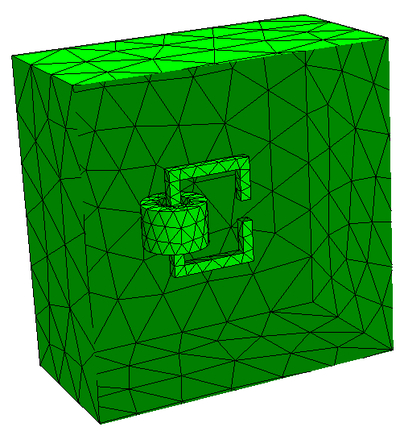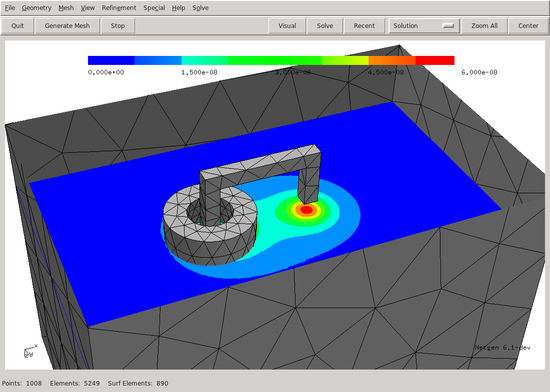Symbolic definition of forms : magnetic field¶
We compute the magnetic field generated by a coil placed on a C-core. We see how to
model a 3D constructive solid geometry
set material properties from domain and boundary labels
define bilinear- and linear forms symbolically using trial- and testfunctions
Download cmagnet.py
from netgen.csg import *
from ngsolve import *
def MakeGeometry():
geometry = CSGeometry()
box = OrthoBrick(Pnt(-1,-1,-1),Pnt(2,1,2)).bc("outer")
core = OrthoBrick(Pnt(0,-0.05,0),Pnt(0.8,0.05,1))- \
OrthoBrick(Pnt(0.1,-1,0.1),Pnt(0.7,1,0.9))- \
OrthoBrick(Pnt(0.5,-1,0.4),Pnt(1,1,0.6)).maxh(0.2).mat("core")
coil = (Cylinder(Pnt(0.05,0,0), Pnt(0.05,0,1), 0.3) - \
Cylinder(Pnt(0.05,0,0), Pnt(0.05,0,1), 0.15)) * \
OrthoBrick (Pnt(-1,-1,0.3),Pnt(1,1,0.7)).maxh(0.2).mat("coil")
geometry.Add ((box-core-coil).mat("air"))
geometry.Add (core)
geometry.Add (coil)
return geometry
ngmesh = MakeGeometry().GenerateMesh(maxh=0.5)
ngmesh.Save("coil.vol")
mesh = Mesh(ngmesh)
# curve elements for geometry approximation
mesh.Curve(5)
ngsglobals.msg_level = 5
fes = HCurl(mesh, order=4, dirichlet="outer", nograds = True)
# u and v refer to trial and test-functions in the definition of forms below
u = fes.TrialFunction()
v = fes.TestFunction()
mur = { "core" : 1000, "coil" : 1, "air" : 1 }
mu0 = 1.257e-6
nu_coef = [ 1/(mu0*mur[mat]) for mat in mesh.GetMaterials() ]
print ("nu_coef=", nu_coef)
nu = CoefficientFunction(nu_coef)
a = BilinearForm(fes, symmetric=True)
a += nu*curl(u)*curl(v)*dx + 1e-6*nu*u*v*dx
c = Preconditioner(a, type="bddc")
# c = Preconditioner(a, type="multigrid", flags = { "smoother" : "block" } )
f = LinearForm(fes)
f += CoefficientFunction((y,0.05-x,0)) * v * dx("coil")
u = GridFunction(fes)
with TaskManager():
a.Assemble()
f.Assemble()
solver = CGSolver(mat=a.mat, pre=c.mat)
u.vec.data = solver * f.vec
Draw (u.Deriv(), mesh, "B-field", draw_surf=False)
Mesh and magnitude of magnetic field visualized in Netgen:

